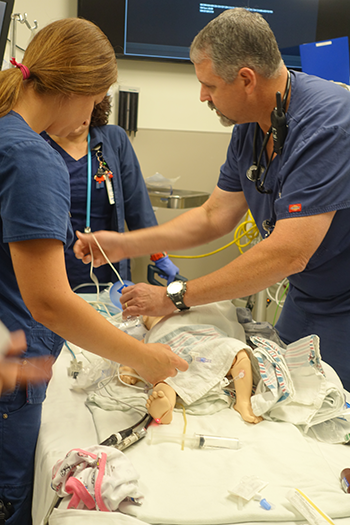Exemplary Professional Practice
Trauma Nurse Fellowship Program
Trauma is the leading cause of death in individuals under the age of 45. With the increasing need for specialized care, University Health Trauma Services has created a comprehensive educational program focused on trauma nursing care. A group of trauma leaders at University Health envisioned the innovative program, which equips nurses with the resources to navigate interdisciplinary boundaries, as trauma patients often have complex injuries that require multispecialty care. Doing so not only increases the knowledge and skills of the trauma nurse, but also provides a holistic approach to patient care. The Trauma Nurse Fellowship Program was implemented in August 2014.
This one-year program immerses the fellow into the full continuum of care of the trauma patient, from the point of admission through outpatient follow up. The program includes clinical rotations with:
- Ground and air EMS
- Trauma Resuscitation Unit (TRU)
- Surgical Trauma ICU (STICU)
- Pediatric ICU (PICU)
- Neuro ICU
- Trauma Follow-Up Clinics
- OR
- Rehab
Administrative rotations focus on:
- Trauma Leadership
- Process Improvement (PI)
- Injury Prevention (IP)
- Registry
- Research
Fellows also participate in monthly education seminars that include didactics, simulations and hands-on training.
During these clinical rotations, each fellow is paired with a preceptor. These preceptors are specialists in their field. The experience in these essential clinical areas strengthens the nurses’ clinical performance and provides multiplicity in the settings in which the trauma nursing fellow will practice.
Understanding the collaboration of the various disciplines involved in the care of the trauma patient allows for a broader understanding of nursing interventions and how the role of the nurse affects patient outcomes from a systems view. Exposure to organizations such as the Southwest Texas Regional Advisory Council and Texas Trauma Coordinators Forum provides a view of the trauma system at a regional and state level.
Every year, the program accepts up to three applicants. Fellows receive paid training and an educational stipend. The fellows also make a commitment to use the knowledge gained in a trauma-related service area. Candidates often come from emergency departments and intensive care units because critical care experience is a requirement.
The Trauma Nurse Fellowship Program began accepting applications from outside University Health in 2016, which made the fellowship an avenue for nursing recruitment. Twenty-nine nurses have graduated since the launch of the fellowship program. Alumni stay active with the fellowship program as mentors for future fellows.
For information about the University Health Trauma Nurse Fellowship Program, please contact TraumaNurseFellowship@uhtx.com.
Nurse Residency Program Accreditation
The University Health Nurse Residency Program (NRP) has earned Accreditation with Distinction as a Practice Transition Program from the American Nurses Credentialing Center’s Accreditation Program.
The one-year program supports new graduates employed as staff nurses in both clinical units and in ambulatory settings. Grounded in Patricia Benner’s theoretical framework, ‘From Novice to Expert: Excellence and Power in Clinical Practice’, the program features monthly sessions throughout the first year to aid new nurse graduates as they transition into their professional nursing role.
Outcome data shows that the residents develop improved confidence, competence, communication skills and leadership capacity, along with reduced stress levels. Residency sessions and facilitator support help new nurses acquire the professional practice skills needed to thrive as integral members of the health care team. Monthly sessions include discussions, simulation, and interactions with various University Health departments and personnel.
Nurse residents conduct evidence-based practice (EBP) projects aimed at enhancing nursing practice or patient care, either directly or indirectly. These projects have been implemented across various inpatient units, covering topics such as sensory carts for pediatric patients, legacy boxes for adult care, and a resiliency committee for emergency department staff.
Implementing the Nurse Residency Program showcases University Health's dedication to new graduate residents by continuously monitoring program outcomes, ensuring evidence-based content, and making annual revisions to uphold program standards.
University Health Simulation Center
University Health Simulation Center’s mission is to improve the quality of health care to our patients. We offer all members of health care teams an opportunity to practice in a safe learning environment. Our simulation activities focus on building an expert team, supporting transition to practice, and developing skills.
We have a 10-room simulation center located on the 6th floor of the Rio Tower. In addition, our simulation team facilitates system-focused activities in the in-situ environment.
In 2023, our simulation program proudly achieved full accreditation in Teaching and Education from the Society for Simulation in Healthcare. This prestigious accreditation guarantees our program’s dedication to advancing patient safety and enhancing clinical outcomes through state-of-the-art resources and training. Simulation allows our staff to gain hands-on experience in realistic clinical scenarios without any risk to patients, fostering increased competence and confidence in their abilities. In 2024, we facilitated over 200 simulation activities, further demonstrating our commitment to providing exceptional training that translates into improved care for our patients.
Integrative Medicine Program
Visit our Integrative Medicine Program webpage for more information.


